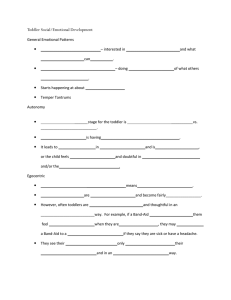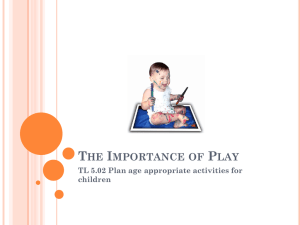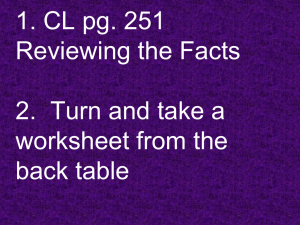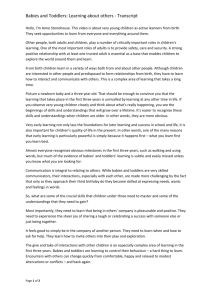Tip Sheet for Parents - Why play is important
advertisement
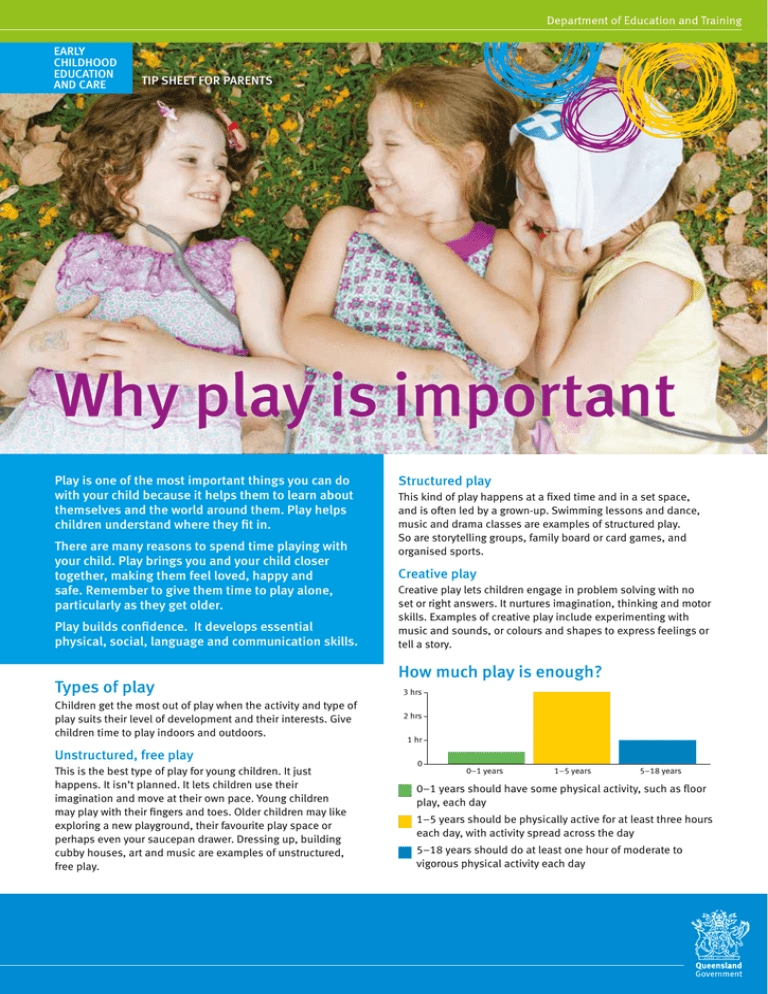
EARLY CHILDHOOD EDUCATION AND CARE TIP SHEET FOR PARENTS Why play is important Play is one of the most important things you can do with your child because it helps them to learn about themselves and the world around them. Play helps children understand where they fit in. There are many reasons to spend time playing with your child. Play brings you and your child closer together, making them feel loved, happy and safe. Remember to give them time to play alone, particularly as they get older. Play builds confidence. It develops essential physical, social, language and communication skills. Types of play Children get the most out of play when the activity and type of play suits their level of development and their interests. Give children time to play indoors and outdoors. Unstructured, free play This is the best type of play for young children. It just happens. It isn’t planned. It lets children use their imagination and move at their own pace. Young children may play with their fingers and toes. Older children may like exploring a new playground, their favourite play space or perhaps even your saucepan drawer. Dressing up, building cubby houses, art and music are examples of unstructured, free play. Structured play This kind of play happens at a fixed time and in a set space, and is often led by a grown-up. Swimming lessons and dance, music and drama classes are examples of structured play. So are storytelling groups, family board or card games, and organised sports. Creative play Creative play lets children engage in problem solving with no set or right answers. It nurtures imagination, thinking and motor skills. Examples of creative play include experimenting with music and sounds, or colours and shapes to express feelings or tell a story. How much play is enough? 3 hrs 2 hrs 1 hr 0 0–1 years 1–5 years 5–18 years • 0–1 years should have some physical activity, such as floor play, each day • 1–5 years should be physically active for at least three hours each day, with activity spread across the day • 5–18 years should do at least one hour of moderate to vigorous physical activity each day How to play As children grow, the way they play changes. Babies might be happy with peek-a-boo but older children will be more creative and experiment more. This means they will need more space to play. Playing with babies You are the person your baby will want to play with the most. Guide and reassure them through new experiences. They will squeeze, roll, tap and put everything into their mouths – an important way of learning about the world through play. Baby play ideas • Tummy time helps your baby to develop movement control by strengthening head, neck and body muscles. • Music, songs, bells or containers filled with different objects can help develop babies’ hearing and movement. • Objects of different sizes, colours and shapes can encourage reaching and grasping. • Sturdy furniture, balls, toys or boxes can get babies crawling, standing and walking. Playing with toddlers Toddlers will want to spend more time playing with other children. From about 14 months of age, toddlers may start to play side-by-side with other children. By about the age of three, they will start to play with, rather than beside, playmates. Toddlers will still want to play with you too. You will remain one of their favourite playmates throughout most of their childhood. Toddler play ideas • Big and light objects, such as cardboard boxes, buckets and blow-up balls can help toddlers to develop running, building, pushing and dragging movements. • Chalk, rope, music or containers encourage jumping, kicking, stamping, stepping and running. • Hoops, boxes, large rocks or pillows can be used for climbing, balancing, twisting, swaying and rolling. • Hills, tunnels or nooks encourage crawling and exploring. Toddlers also enjoy sand, garden and water play, clay and playdough, finger-painting, pasting and sticking, puppets, threading, sorting puzzles, cooking, make-believe, dress-ups, throwing and catching, guessing games, and riding a tricycle, scooter or bike. Playing with kindy-age children Children of this age want to play with their friends as much as they want to play with you. Play helps them to learn about getting along with their peers and getting to know themselves. 150233 Kindy-age children play ideas • Old milk containers, wooden spoons, empty pot plant containers, sticks, scrunched-up paper, plastic buckets, saucepans and old clothes can be used for imaginative and unstructured play. • Favourite CDs or pots and pans can be used to stage a dance or music concert. • Balls and frisbees can encourage kindy-age children to kick, throw, catch and roll. Playing with school-age children You’re still an important playmate but school-age children put a great deal of energy into developing relationships with others. This will continue as they mature. You will eventually become the person they turn to for support. School-age children play ideas • School-age children’s imagination becomes one of their greatest assets as they play, for example: −furniture, linen, washing baskets, tents and boxes can be used for building −homemade obstacle courses get them moving in different ways, directions and at different speeds. • Consider getting your school-age child involved in organised sports or team activities, or holiday art and craft. If your child doesn’t want to play There might be times when your child is tired or bored with the same activity and doesn’t want to play. This is normal. However, if you notice a general lack of interest in play, consider talking to your family doctor. A final word on play You don’t need to spend lots of money on toys. Many everyday items can be used as toys. Get creative. Food packages, cardboard boxes, old clothes, old pots and pans, leaves, feathers and fabric are great for play. Don’t forget there are shadows to chase and trees to climb too. More information The Queensland Government provides families with up-to-date information about approved early childhood education and care services in their local area, and has parent tip sheets on a range of topics. To access the latest information or to find an early childhood education and care service call 13 QGOV* (13 74 68) or visit www.earlychildhood.qld.gov.au. For service ratings visit the MyChild website at www.mychild.gov.au or the Australian Children’s Education and Care Quality Authority (ACECQA) website at www.acecqa.gov.au. Other languages If you need an interpreter, phone 13 QGOV (13 74 68). Assistance making a call If you are deaf or have a hearing or speech impairment: • TTY users phone 133 677*, then ask for 13 74 68*. • Speak-and-listen users should phone 1300 555 727*, then ask for 13 74 68* • Internet relay users should connect to the National Relay Service at www.iprelay.com.au/call/index.aspx then ask for 13 74 68*. Acknowledgement The information in this publication was sourced from the Raising Children Network at www.raisingchildren.net.au Disclaimer This publication is offered as a guide and should not be considered an exhaustive statement on the subject. *Calls from mobile phones are charged at applicable rates. Information correct at time of publication, February 2015. Photography: Lime

